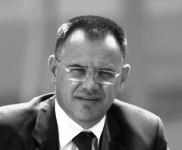 The assassination of Ivo Pukanic and Niko Franjic reveals the dangers of reporting on Croatia’s complex organised crime world, writes Goran Milakovic
The assassination of Ivo Pukanic and Niko Franjic reveals the dangers of reporting on Croatia’s complex organised crime world, writes Goran Milakovic
Ivo Pukanic, columnist with Nacional magazine and chairman of the NCL Media Group, was killed yesterday in a bomb attack in front of his office in the centre of Zagreb. The explosion also killed his associate Niko Franjic, and wounded two Nacional employees.
This was the second attempt on Pukanic’s life this year — he survived an attack in April. After the recent brutal murder of lawyer Ivana Hodak, whose father Zvonimir Hodak is defending former General Vladimir Zagorec in a jewellery smuggling case, fear is now ruling the streets of the Croatian capital, while government officials are promising to put an end to organised crime and terror.
Police took over the whole city yesterday after the killing. President Mesic said that the attack was an act of terrorism, while Prime Minister Ivo Sanader likened the situation to Lebanon. ‘We will not let Zagreb become Beirut, and rest assured that we will make every effort to bring safety back to our streets,’ he said last night in an address to the Croatian public.
According to the latest police reports, the bomb that killed Pukanic was planted in a rubbish bin near his brand new Lexus and activated by remote control. So far, more than 150 people have been questioned by the police, in what looks set to be one of the biggest investigations ever conducted in Croatia. Police investigators are still on the crime scene, but it’s already obvious that the murder is the work of professionals.
Sources close to the investigation say that the bomb was the state of the art, and one of the eyewitnesses who saw the explosion said that Pukanic and Franjic were standing near the vehicle when the lethal device was activated.
There are reports that a man in his early 30s was seen running out of the backyard of the Nacional building immediately after the explosion, so there is a chance that the assassin was at the scene at the time of the explosion.
Ivo Pukanic was first targeted for assassination in 2002, when a man allegedly tried to stab him while he was going to his office. After that attack, Pukanic was under constant police protection and surveillance, especially after another attempt on his life, in April, failed. Pukanic then reported to the police that an unknown male tried to shoot him in front of his home. According to the statement he gave police at the time, the assassin missed, so he had the chance to shoot back and scare him away.
Pukanic claimed then that he had been a target of extortion, and even filed a complaint against a lawyer, Darko Zadro, and a former member of anti-terrorist unit Renato I.
In spite of this, the police security assessment resulted in a suspension of some protective measures towards Pukanic.
‘For the past two months we were implementing occasional measures of monitoring for Mr Pukanic, on the basis of our security assessment. These consisted of monitoring his home when he was leaving or entering the place,’ said senior police official Kresimir Borovec.
Ivo Pukanic was one of the most controversial journalists and businessmen in Croatia. Until 1995 he worked as a journalist for numerous magazines and newspapers, and later as an editor-in-chief of news magazine Globus. By the end of 1995 he left Globus with a group of journalists to set up the political magazine Nacional, where he wrote about organised crime, intelligence, war profiteering and the dirty secrets beneath everyday politics.
He was himself, to a certain extent, part of that milieu. He never tried to hide friendships with convicted criminals such as Hrvoje Petraë, who is now serving a sentence for kidnapping a son of General Zagorec. Pukanic was a friend of General Zagorec too, but the link between his assassination and the beginning of the trial of Zagorec, accused of smuggling jewels intended for the purchase of weapons for the defence of Croatia during the war, is still pure speculation.
Nevertheless, Pukanic was awarded a Journalist of the Year prize by the Croatian Journalist Association, as well as a prize for research journalism given by the same organisation one year later. In 2003, he received a special reward for his interview with General Ante Gotovina, who was at that time a Hague fugitive out of the reach of international law.





